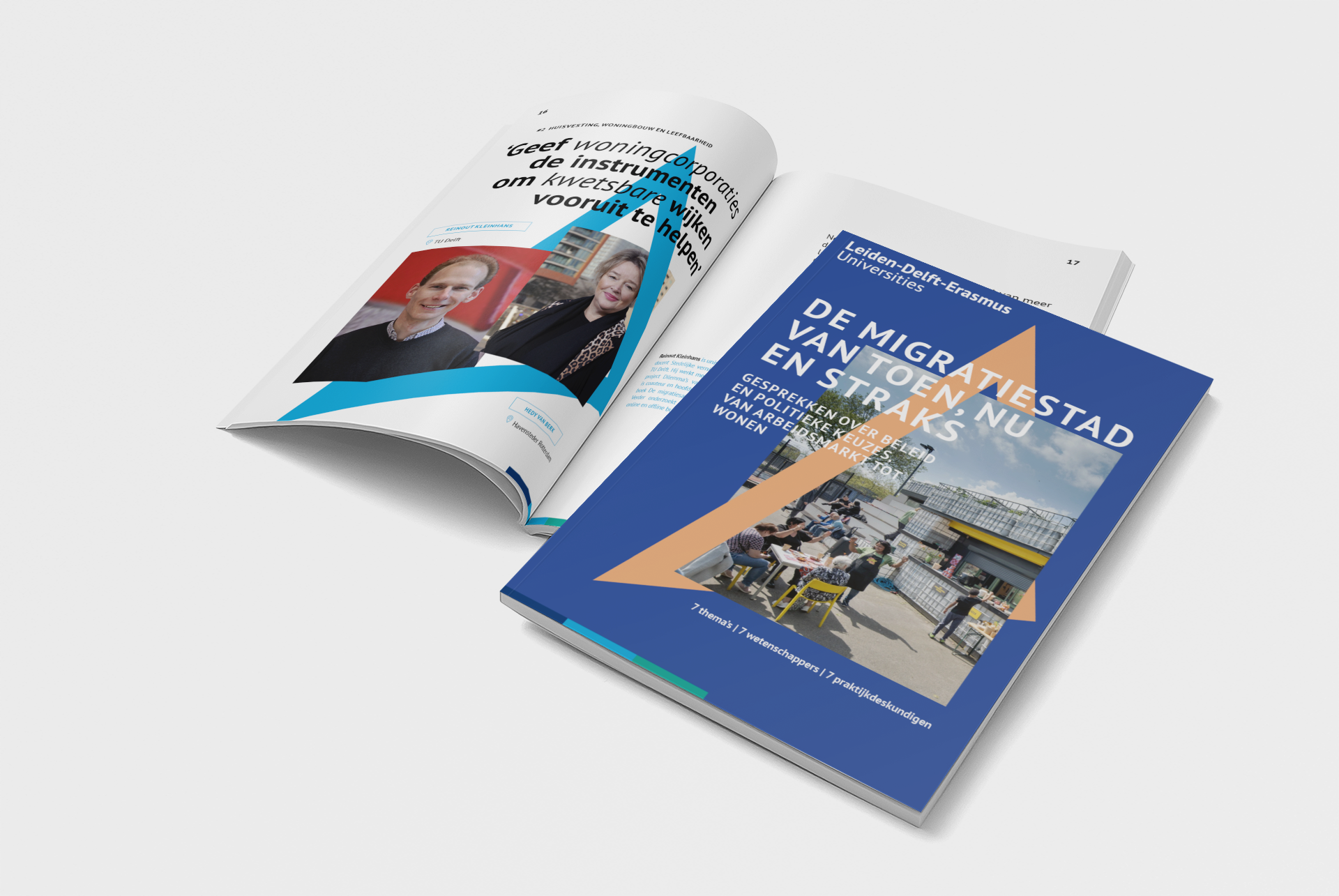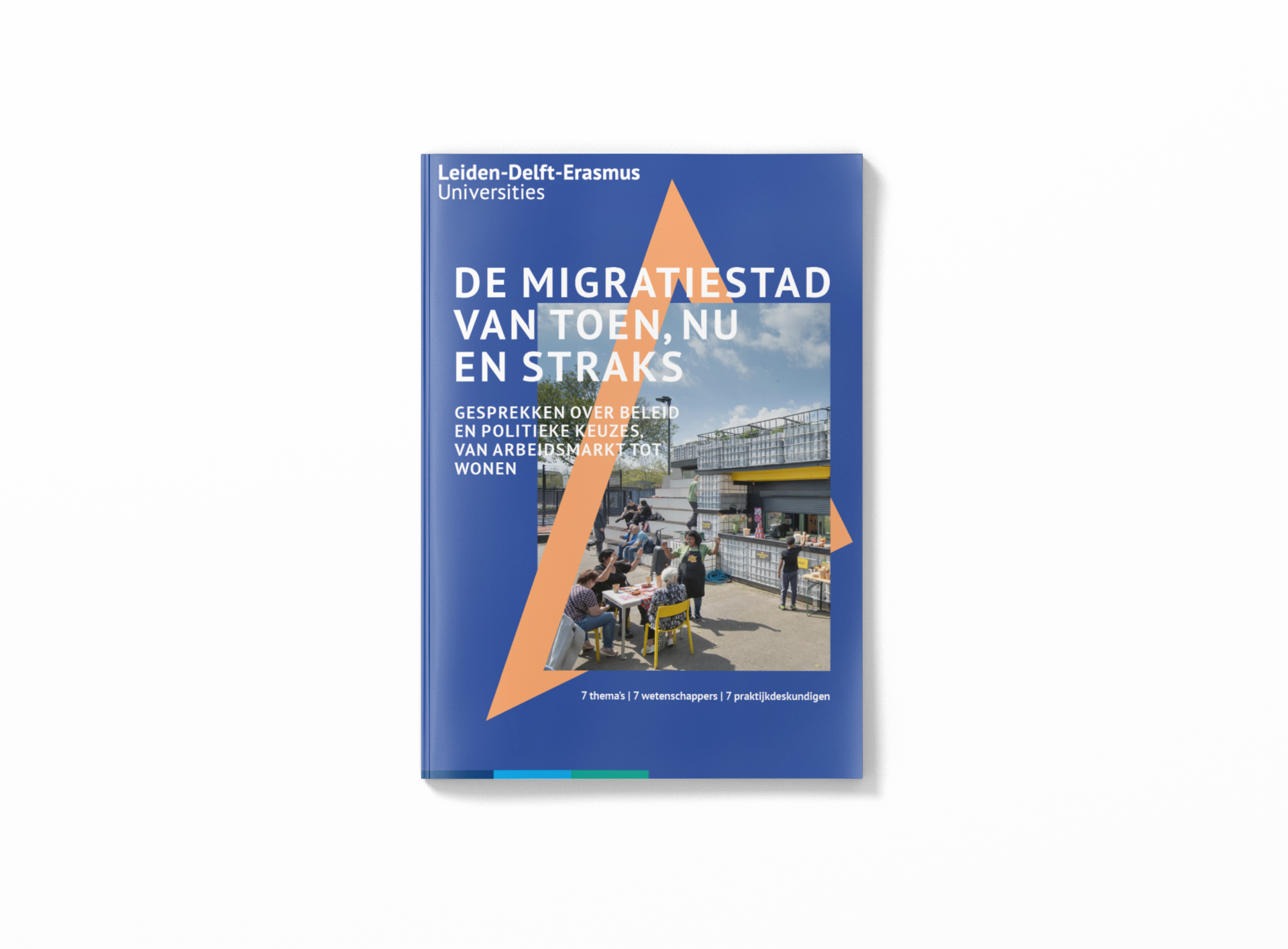On November 13, during the annual LDE GMD conference, we will launch the GMD Centre's first white paper titled "The Migration City: Past, Present, and Future - Conversations on Policies and Political Choices, from the Labour Market to Housing." This white paper features the contributions of seven scholars from the Leiden-Delft-Erasmus University and seven practitioners. Together, these experts engage in thematic conversations on critical topics related to migration and diversity.
#1 Labour market and migration | “The benefits and disadvantages of labour migration are unevenly distributed” - Olaf van Vliet (Professor of Economics, Leiden University) and Imke van Gardingen (FNV policy advisor)
#2 Housing, house building, and quality of life | “Give housing associations the tools to help vulnerable neighbourhoods move forward” - Reinout Kleinhans (associate professor of urban renewal, TU Delft) and Hedy van den Berk (chairman of the board of the Havensteder housing association)
#3 Asylum, dispersal, and the Dispersal Act | “Allow asylum seekers to integrate straight away” - Elina Jonitz (PhD candidate in Public Administration and Sociology, Erasmus University Rotterdam) and Anne Backer (advisor at the COA, the central agency for the reception of asylum seekers)
#4 Discrimination and exclusion | “Polarisation is good. Much better than an uneasy silence” - Nadia Bouras (lecturer in the history of Morocco and Moroccan migration, Leiden University) and Tikho Ong (project manager at the RADAR anti-discrimination agency)
#5 Political participation and representation | “Especially in superdiverse cities, a unifying message has great potential” - Warda Belabas (lecturer in Governance of Migration and Diversity, Erasmus University Rotterdam) and Mustapha Eaisaouiyen (activist and opinion maker)
#6 Crime, safety, and migration | “The first step towards a safe city is good education.” And robust policing” Henri Lenferink (PvdA politician and administrator; chairman of the provincial Migration Direction Table) and Maartje van der Woude (Professor of Law and Society, Leiden University)
#7 Intersectionality | “Shared humanity returns when you meet each other again in your neighbourhood“ - Caroline Newton (associate professor of urban planning, TU Delft) and Wouter Veldhuis (National Advisor for the Physical Living Environment)

In this blog post, we interview Dr. Reinout Kleinhans, the scientific coordinator and our centre's executive board member. He shares insights into the motivation behind the white paper, its significance and intended impact, as well as the process of its creation. This white paper represents a significant step in addressing the complex issues surrounding migration and diversity, emphasising the importance of fostering meaningful dialogue.
What prompted the creation of this publication, and why is a white paper on migration and diversity significant?
Migration and migration-related diversity are - always have been - a central element in the formation and functioning of cities. There are countless ideas about how migration and diversity can be a problem, solution, cause, effect, opportunity or threat. We now witness quickly rising social and politicals tension surrounding the governance of migration and migration-related diversity. Disinformation and prejudice are constantly lurking. This is precisely why it is important to keep talking about these topics, from different perspective, and taking into account both scientific research, facts and societal sentiments and experiences. One the one hand, we should take a critical stance against declaring an 'asylum crisis' on the basis of popular sentiments, when the facts show no extraordinary situation at all. On the other hand, it would be naive to simply dismiss popular concerns, because many people see or experience the negative externalities of, for example, labour migration on a daily basis.
How are diverse perspectives from scientific research, facts, and societal sentiments and experiences captured in the white paper?
In this white paper, seven scientists from the Leiden-Delft-Erasmus universities and seven practical experts give their views on issues and developments in the migration city. They do so in pairs. Rather than fully opposing each other, these are dialogues exploring fundamental issues and solutions in the migration city of yesterday, today and tomorrow, based on both scientific and experiential knowlegde. This open dialogue is crucial to stay away from the already rising polarisation in politics and societal debate.
What are the impacts that you envision from this whitepaper?
The white paper is not about science speaking truth to power, but about channelling research and debate around a topic where having a good conversation has become increasingly difficult. Within LDE GMD, we have experienced how important it is to approach migration from different disciplines. The white paper offers balanced views on seven themes closely related to migration, including asylum, integration, labour market, housing, safety, participation and representation, and spatial justice. The white paper is succesful if it encourages people to take a more integrated and nuanced stance towards the role of migration and diversity in these issues, appreciating their complexity. Mainly focussing on asylum, as the Schoof administration is doing, will not bring us any closer to solving the fundamental issuesthat everyone agrees on, such as the housing crisis.
Join us at the annual conference to participate in the launch with dr. Reinout Kleinhans (TU/ Delft), Imke van Gardingen (FNV) and Jan Jaap Kleinrensink (VluchtelingenWerk Nederland)

